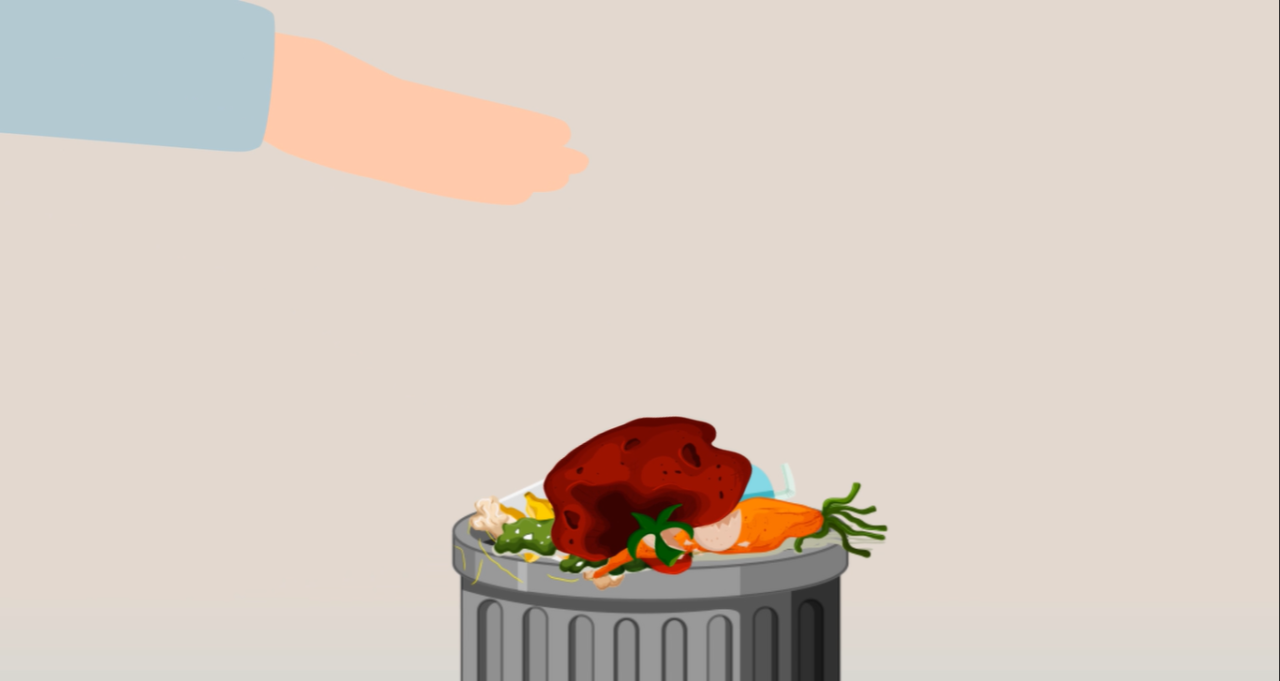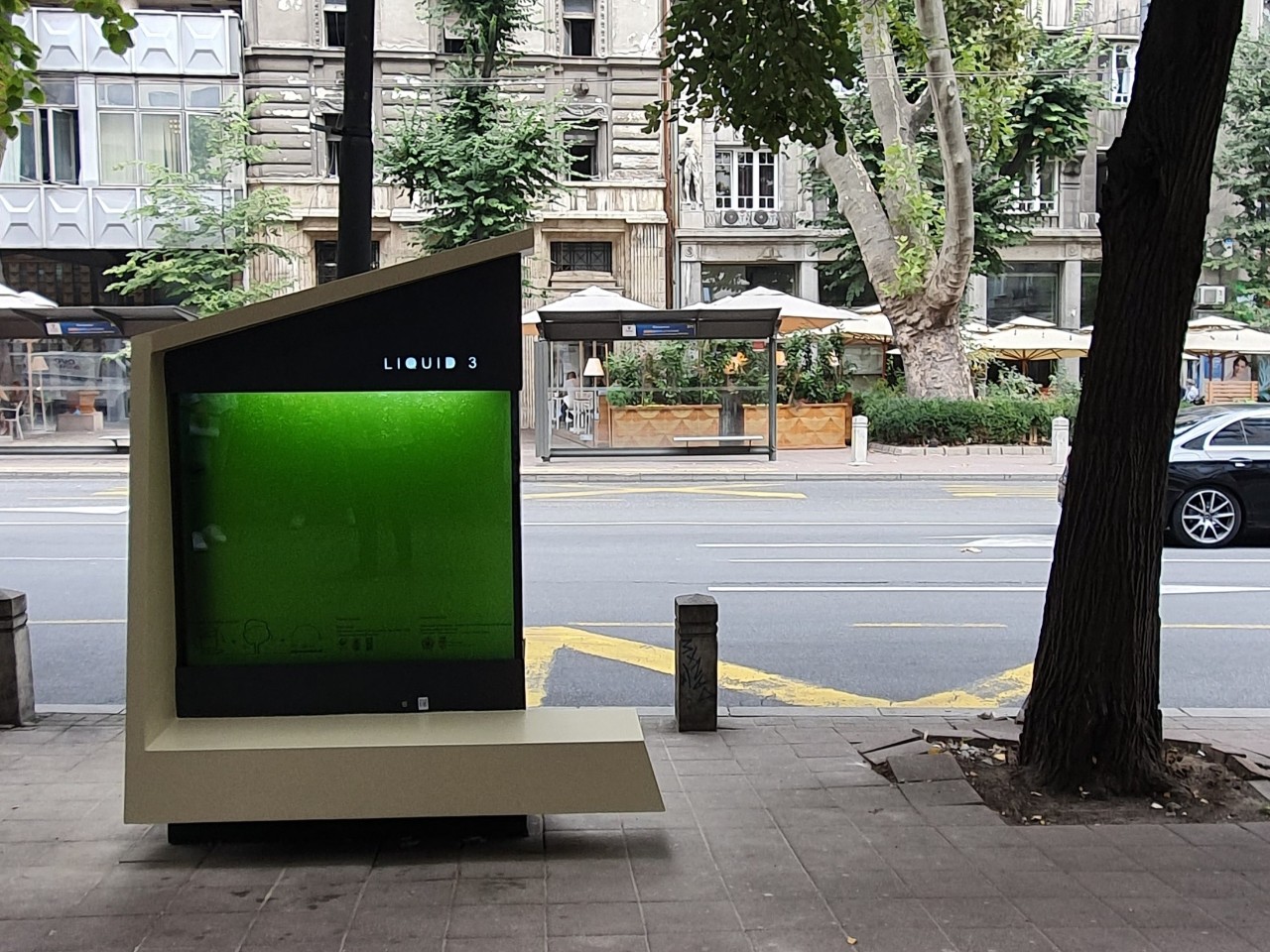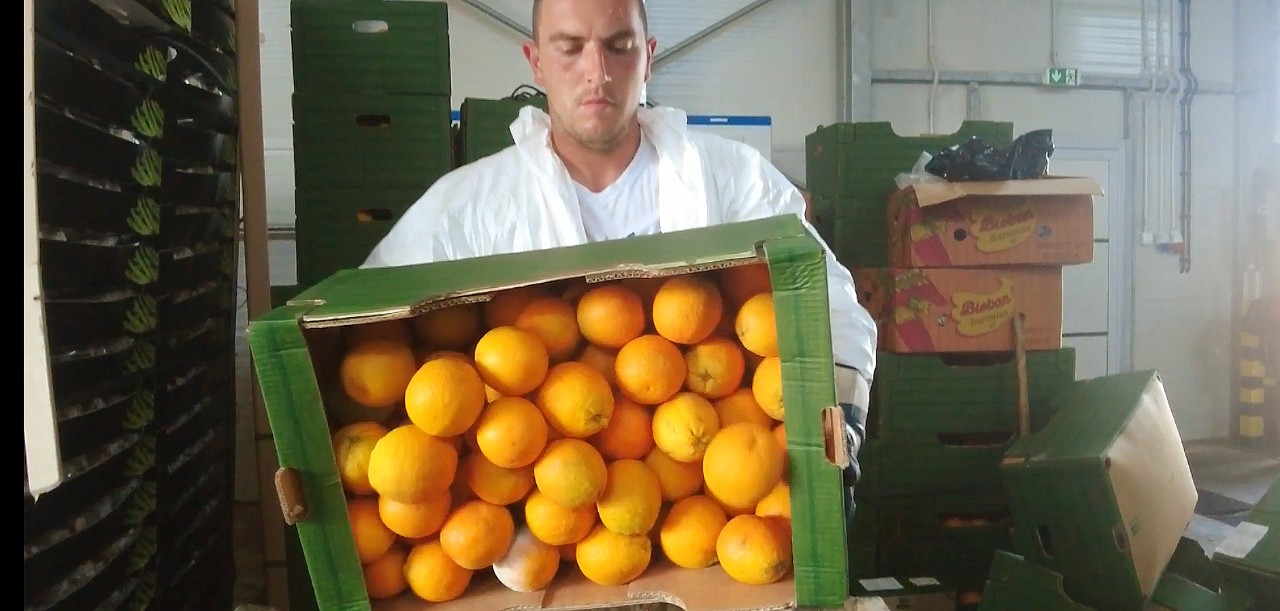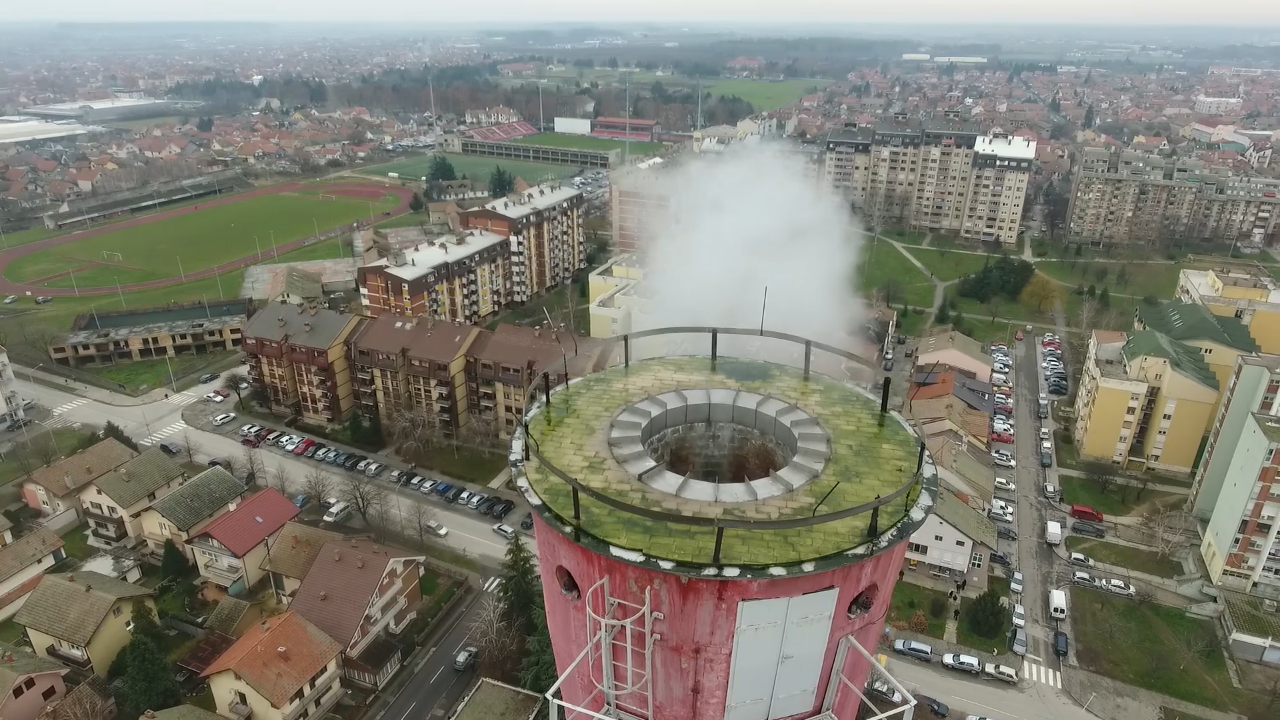-
Nov 06 2021 Celebration of the World Food Day
World Food Day is celebrated all over the world on October 16. through various actions and manifestations. This global event marks a day calling for worldwide awareness and collective action to combat the issue of hunger and ensure healthy diets for all. On this occasion, we have prepared tips on how to reduce food waste in households with simple steps that save money, while protecting the planet from pollution and reducing global warming.
The Food and Agriculture Organization (FAO) of the United Nations established World Food Day in 1979, and every year this important date is celebrated in more than 150 countries. This date has been celebrated in Serbia since 2001.
Video Player00:0000:00 -
Sep 21 2021 THE FIRST ALGAE AIR PURIFIER IN SERBIA
The first urban photo-bioreactor in Serbia, “LIQUID 3”, has been placed in front of the Municipality of Stari Grad in Makedonska Street in Belgrade. This “liquid tree”, as it is called at the “Institute for Multidisciplinary Research” of the University of Belgrade, where it was designed, is a completely new biotechnological solution for air purification and reduction of carbon dioxide (CO2) emissions in urban areas where its concentrations are highest.
“More than half of the population of Serbia lives in urban settlements, even 59%, and that number is constantly increasing. This greatly affects the density of settlements, the quality of life, the increase in the number of vehicles on the streets, pollution and the increase of harmful greenhouse gas (GHG) emissions. It is estimated that cities are the source of as much as 75% of total CO2 emissions in the world, of which the largest percentage comes from traffic and cooling and heating in buildings”, explained Ms. Francine Pickup, Resident Representative of the United Nations Development Program (UNDP) in Serbia.
According to her, trees and green areas represent natural air purification in urban areas, but there is often a lack of free areas for landscaping. “LIQUID 3” is an efficient and innovative solution for reducing greenhouse gas emissions and improving air quality.
“The photobioreactor is a completely new biotechnological solution for air purification and the production of oxygen. In an aquarium of six hundred liters of water, we have algae that bind carbon dioxide and produce pure oxygen through photosynthesis. The project is designed to be multifunctional. LIQUID3 is also a bench, it has chargers for mobile phones, as well as a solar panel, thanks to which the bench has lighting during the night. The municipality of Stari grad has decided to support this project which directly contributes to improving the quality of life of our fellow citizens, public health and cleaner environment through using smart and innovative solutions “, said Bojan Bojić, head of the Department for social affairs and development projects in the Municipality of Stari grad.
“The microalgae in “LIQUID 3” replace two 10-year-old trees or 200 square meters of lawn. The system is the same because both trees and grass perform photosynthesis and bind carbon dioxide. The advantage of microalgae is that they are 10 to 50 times more efficient than trees. Our goal is not to replace forests, but to use this system to fill those urban pockets where there is no space for planting trees. In certain conditions of great pollution, trees cannot survive, while algae do not mind that pollution”, pointed out Dr Ivan Spasojevic, one of the authors of the project from the Institute for Multidisciplinary Research.
As he explained, the Institute used single-celled fresh water algae, which exist in ponds and lakes in Serbia and can grow in tap water, and are resistant to high and low temperatures. The system does not require special maintenance – it is enough to remove the biomass created by dividing algae, which can be used as an excellent fertilizer, in a month and a half, pour new water and minerals, and the algae continue to grow indefinitely. This project aims to popularize and expand the use of microalgae in Serbia, because they can be used in wastewater treatment, as compost for green areas, for the production of biomass and biofuels, as well as for air purification from exhaust gases from the factories.
“LIQUID 3” was awarded as one of the 11 best innovative and climate-smart solutions within the project “Climate Smart Urban Development”, implemented by the UNDP in partnership with the Ministry of Environmental Protection, with financial support from the Global Environment Facility (GEF). The municipality of Stari Grad, as a partner in the realization of the project, provided the location and allowed the installation of the system.
-
Aug 23 2021 How do you light a lightbulb with food waste?
Do you ever think about what happens to the scraps we throw away during food preparation, such as vegetable peels and eggshells, or to the uneaten bits we scrape from the plate into the garbage can?
While shopping, do you wonder where the food in stores ends up after it expires?
When it is thrown into a regular garbage container, food, together with other waste, ends up in landfills. In Serbia, this is the case for about 250,000 tons of food waste per year. Just 1 percent of waste of biological origin, which includes food waste, is repurposed.
Why should this concern us? Well, food waste in landfills rots and releases carbon dioxide and methane into the atmosphere – the two gases that contribute the most to global warming and negatively affect climate change.
Also, by throwing away food, we are throwing away energy, since each type of organic matter has its own energy value. You simply need to know how to harness and utilize it.
The company Eso Tron from Novi Sad has figured out just that. They started by first collecting edible oil remaining after food preparation from restaurants.
“We were pioneers in Serbia in collecting used cooking oil and other edible oils. Today, we process over 70 percent of the amount of edible oil waste that would previously have been dumped into rivers and would pollute the environment,” says Bojan Gligić, Regional Manager of the company.
All the oil collected by Eso Tron is processed and converted into raw material for the production of energy, such as electricity and biodiesel, and as the business has grown, they have developed technologies which enable them to process other types of food waste in the same way.
“Industry and the hospitality sector are the largest generators of bio-waste and our goal is to educate industry, retail chains, hotels and restaurants about the importance of quality management of this type of waste,” explained Gligić.
This means that Eso Tron, in addition to putting to use waste from restaurants and hotels that would otherwise end up in garbage cans, is working to train staff who work with food on how to dispose of this waste properly, so that as much usable energy as possible can be yielded during processing.
“It might be easier for me to just throw everything in one place, but it’s not hard for me to separate the waste. My motivation is that this waste does not end up in nature, that there is no pollution, and no formation of illegal landfills,” says Dušan Žgonjanin, Chef in one of the restaurants cooperating with Eso Tron.
“Regardless of whether it is a small catering facility or a large factory, the principle is the same. All waste that is brought to our plant undergoes certain treatment in order to be used for biogas production. We have developed technology that can utilize waste of biological origin to obtain energy, achieving a significant reduction in the emission of harmful gases,” Gligić points out.
Thanks to the technology it employs, Eso Tron extracts methane from food, the same gas that would otherwise pollute the environment and warm the planet. Instead, this methane is transformed into a raw material for biogas production. Thus, clean, renewable energy is obtained for the production of electricity and heat. And that is the answer to the question in the title.
When we consume energy that is produced in this way, there is no additional pollution created, which is one of the principles of the circular economy. In this way, the processing of food waste simultaneously saves energy and reduces greenhouse gas emissions, which significantly slows the pace of climate change.
*** *** ***
Eso Tron’s “Reduce Garbage for Collective Health and Happiness” initiative was awarded as one of the 11 best innovative and climate-smart solutions within the Climate Smart Urban Development project, implemented by the United Nations Development Programme (UNDP) in partnership with the Ministry for Environmental Protection, with financial support from the Global Environment Facility (GEF). It is estimated that in the course of the project, emission reductions equivalent to 32,000 tons of CO2 will be achieved, emissions which would otherwise be generated by disposing of such waste in landfills.
-
Apr 09 2021 How both the environment and the citizens of Šabac pay lower price for heating?
In Šabac, the center of the Mačva district in Western Serbia, 10,000 out of 21,000 households still use solid fuels – coal and wood for heating. Clouds of smoke from their chimneys are among the main sources of air pollution during the heating season. They also directly contribute to greenhouse gas (GHG) emissions, heating up the planet, and exacerbating climate change. The situation is similar throughout Serbia, where more than half of households use solid fuels for heating.
To motivate as many citizens as possible to connect to the district heating system, the public utility company (PUC) “Toplana-Šabac” decided not to charge them for the costs of connecting to the system. They also found a way to save both citizens’ money for bills and the amount of energy used for heating.
In Šabac, unlike most cities in Serbia, the heating tariff is based on consumption, and not on the size of heated areas. Therefore, citizens are motivated to consume less thermal energy. One of them is Natalija Tubić, who says that her heating bill is now four times lower.
– We received a bill of 2,000 dinars. For example, in November last year, it was around 8,800 dinars. If you’re not home, you switch the heating off, so you consume less, you pay less, your bills are lower. Earlier, with the non-stop heating, it was too warm. You had to open the windows, and then the heat went to waste. – explains Natalija.
What made these saving possible is that, in parallel with introducing payment per consumption, “Toplana-Šabac”, supported the citizens to improve the thermal insulation of buildings with a subsidy of 50 per cent. Thanks to this initiative energy efficiency was increased in 40 residential buildings.
– For instance, in a building insulated with 10cm of wool or Styrofoam, we’ll save between 150 and 500 euro per apartment during the heating season, depending on the square footage of the apartment. Moreover, we reduced the CO2 emissions by two or three times for that building. – said Slobodan Jerotić, director of PUC “Toplana-Šabac”.
District heating in Šabac operates thanks to a smart system – SCADA, which PUC has been using since 2019. SCADA is hardware and software installed in heating substations – the place of transfer of thermal energy from the distribution grid to the citizens. Currently, 140 heating substations are connected to this remote monitoring system, and the connection of additional 130 is in progress.
– We save energy by distributing only the exact amount of heat that is necessary. Our software allows us to remotely monitor and verify temperature-related complaints, so we can react before a halt in heating supply occurs. – explains Miloš Marinković from the Department of Thermal Energy Distribution of the PUC.
Measurements in substations provide information on whether the buildings receive enough energy, how the connection of the new facility will affect the network, as well as on possible breakdowns. The SCADA system also allows all this data to be analysed. Thus, the PUC established that, on average, 30 breakdowns were recorded on the network annually due to the rapid heating of the system.
Last year, PUC started the system more slowly. Until December, no malfunctions were recorded. The system has thus proven to be cost-effective, especially bearing in mind that the repair of one breakdown can cost 10,000 euros.
To save energy, in addition to installing a smart system of district heating and insulation of buildings, the City of Šabac is also introducing renewable energy sources. In collaboration with the first Energy Cooperative in Serbia, established by the citizens’ association “Sunny Rooftops of Šabac”, a small photovoltaic plant of 3KW was installed on the roof of the thermal power plant.
The next step is a launch of a crowdfunding campaign to expand the photovoltaic plant’s capacity by 17 kilowatts. “Green” energy is also generated in a small boiler that currently uses biomass, instead of fuel oil it previously used. The objective for the future is set high.
– The ultimate goal of our energy policy is to become completely energy independent from fossil fuels by 2050 – announces Slobodan Jerotić.
By implementing this plan, CO2 emissions in Šabac will be reduced to a minimum, thus making the whole city smarter and more efficient in the process of adapting to climate change and energy-related challenges.
„Establishment of the SCADA System for Oversight and Management of Heat Distribution Substations at the District Heating System of the City of Šabac“ has been awarded as one of 11 best innovative and climate-smart solutions within the “Climate Smart Urban Development Challenge” initiative, implemented by the United Nations Development Programme (UNDP) in partnership with the Ministry of Environmental Protection, with financial support from the Global Environment Facility (GEF). It is estimated that this initiative will contribute to reduction of CO2 emissions by 31,660 tons, which is equal to the emissions of about 6,200 passenger vehicles in motion during one year.
-
Mar 25 2021 The Digital Platform for Circular Economy has started working
The Chamber of Commerce of Serbia (PKS), United Nations Development Program (UNDP) and the German Agency for International Cooperation (GIZ) have founded the Digital Platform for Circular Economy (CE-HUB). As it was explained at the online conference during the launching of the platform, it will support companies through business models, good practice and other tools, to facilitate the development of the circular business model, reduce the carbon footprint in production processes and products and maintain competitiveness in the European and international market.
– CE-HUB represents a source of knowledge and activities intended primarily for the Serbian economy, in order to turn to green investments – said Mihailo Vesović, Director of the Division for Strategic Analyses, Services and Internationalization of the Chamber of Commerce and Industry of Serbia, at a conference attended by more than 160 representatives of companies, local governments and institutions.
According to Žarko Petrović, Programme Specialist – Resilient Development at UNDP, there are currently several thousand dump sites in Serbia that are polluting the environment, and the development of the recycling industry could open 30,000 new jobs by 2030.
– Circular economy: reuse, repurposing or recycling of materials could reduce 33 percent of the greenhouse gas emissions. UNDP supports and finances the development of circular business models in Serbia, such as Jugo-Impex E.E.R. and company Eso Tron Ltd. Given the EU Green Deal and Serbia’s new climate strategic framework, we believe that circular economy is an opportunity to make the economy greener, resilient and sustainable – said Petrović.
Antoine Avignon, Program Manager at the EU Delegation in Serbia for Environment and Climate Change, explained how important the platform for promoting the circular economy in Serbia is. According to Avignon, the Green Agenda for the Western Balkans is a good framework and in cooperation with UNDP study on green finance will be prepared, which will help to define tools for financing green business.
– In the previous year two strategic documents were adopted, with a goal to improve the environment of the circular economy, one is a proposal for defining specific public policies in this area, and the other is the new Industrial Policy Strategy of Serbia – said Tomislav Knežević from GIZ.
Marko Pećanac, Foreign Investment Advisor at the Office of the President of the Republic of Serbia, invited companies, especially members of the Green Alliance, to propose in cooperation with the PKS potential solutions to address regulatory
barriers as effectively as possible and to make Serbia a regional leader in this field. As he pointed out, the President and the Government of the Republic of Serbia are giving their full support to the green transition.
Siniša Mitrović, Head of the Centre for Circular Economy of the PKS stressed out that the transition to a circular economy will increase the resilience of the Serbian economy to climate change, and GDP by 1 percent.
– For the green transition to come to life, the most important thing is the transfer of knowledge and access to finance for companies – said Mitrović and added that CE-HUB’s activities will focus on cooperation with the Green Alliance and “green managers” dealing with the circular economy in companies.
Nenad Miščević, CEO of the Nectar Group, pointed out that the company is proud to be one of the founders of the Alliance for Green Transformation, as well as that Nektar has invested more than 7 million euros in a biogas plant in Bačka Palanka and biomass plant in Vladičin Han.
– These investments make it possible for us to use organic waste from fruit processing and other organic materials for the production of green energy and organic fertilizer for our fruit plantations – said Miščević and added that this company is committed to reducing emissions by 20% by 2030.
Representatives of the Bosis, Ball Packaging Europe and Strauss Adriatic announced more intensive activities to modernize production processes, in order to reduce the carbon footprint of products and increase the use of renewable energy sources in production.
Companies in Green Alliance: Bosis, Strauss Adriatic, Ball Packaging, Division Visual Solutions, Green Fusion Energy, ElixirEnergy, Coca Cola HBC Srbija, Trayal Corporation, Avista-Oil, Knjaz Miloš, Eso Tron, E-Reciklaža, Nectar, Bio Energo Partner MD, Institut Eko-privrede Stara Pazova, Stejpak, PUC Toplana-Šabac, Association 3E, Cirekon, Umka Cardboard Mill, Science and Technology Park Niš, Polipak.
For more information about the Platform for Circular Economy: https://www.circulareconomy-serbia.com/






